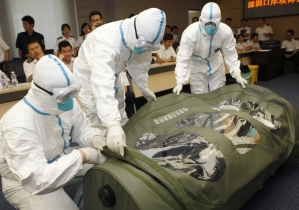
The spread of Ebola in West Africa and the slow international response has led to increasing calls for China, Africa's biggest trading partner, to do more to help contain the epidemic.
The pressure on China highlights the country's changing international status. As the world's second-largest economy, it is expected to take on more of the burden of responding to international crises. But it is still a developing nation, poorer per capita than the United States, Japan or European Union countries.
On Tuesday, China announced that it was sending a mobile lab with 59 experts to Sierra Leone, the third team it has dispatched to the country. Over the past month, China has contributed $37 million in food, medical supplies and cash to help African countries and aid organizations combat the disease.
The United Nations said on Tuesday that it would cost nearly $1 billion to contain the disease, which has killed more than 2,400 people thus far. Half of the cases have come in the past three weeks, according to the World Health Organization, with Guinea, Liberia and Sierra Leone hardest hit by the accelerating outbreak, according to The New York Times.
The United States, which has been criticized for not doing more to help control the spread of the disease, announced a dramatic increase in support on Tuesday. The United States military will send 3,000 personnel to combat what President Obama called "an epidemic of the likes that we have not seen before." The United States Agency for International Development said that it had spent more than $100 million on protective equipment and relief supplies and planned to budget another $75 million. The Department of Defense is preparing to budget an additional $500 million toward the effort.
Following the American announcement, some commentators called for more support from China, which has extensive investments in natural resources and infrastructure development in Africa as well as a million of its citizens working there, according to The New York Times.
In a piece for Bloomberg View titled "Africa's Ebola Should Be China's Problem," James Gibney wrote:
"Chinese foreign investment has been a powerful force for African economic development (and, sadly, for the retirement funds of African kleptocrats). But China isn't going to build up its soft power unless its government and state-owned enterprises in Africa are willing to dig a little deeper."
China has pointed out its long-running contributions to public health in Africa. A State Council white paper last month said that China had 43 medical teams in 42 African countries, had aided in the construction of 30 hospitals and 30 malaria prevention centers, and had contributed $130 million worth of medical supplies, according to The New York Times.
And China's contributions to efforts against Ebola have earned high-level praise. Margaret Chan, director general of the World Health Organization called the newly announced mobile lab for Sierra Leone "a huge boost, morally and operationally," according to a W.H.O. statement.






